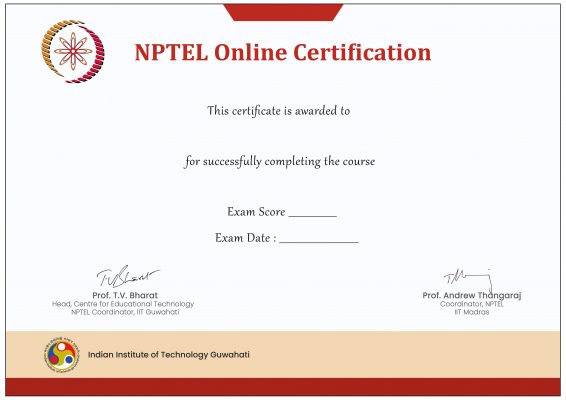Description
ABOUT THE COURSE:
In the current MOOCs course I have put effort to briefly discuss different analytical techniques and their potential in solving the scientific problems. We are taking several scientific problems or questions which can be solved by using these techniques. By the end of this course, student will be able to understand:
1. Basics of Good Lab practices.
2. Understanding different analytical techniques and their applications.
3. Specific Scientific questions and their solutions.
4. Designing new experiments.
INTENDED AUDIENCE : PG/PhD
PREREQUISITES : General Biology 10+2
INDUSTRY SUPPORT :
- Biocon https://www.biocon.com/
- Jubilant Life Sciences www.jubl.com/
- Shantha Biotechnics Ltd
- Panacea Biotec
- Other companies related to biotechnology
ABOUT THE INSTRUCTOR

Prof. Trivedi did his Ph.D. from Central Drug Research Institute, Lucknow in the field of Structural Biology. From his postdoctoral research at the Department of Molecular and Cellular Biology, Harvard University and Molecular Oncology Research Institute, Tufts University, Boston, USA, he gained extensive research experience in the field of cell biology, intracellular signal transduction, and immunology. Currently, his laboratory at Department of Biosciences and Bioengineering has an active group working and exploring questions related to malaria parasite biochemistry, the role of novel proteins, development of anti-malarial agents, and lastly understanding factors playing a crucial role in immunomodulation and host pathology in different organs
Certification Process
1. Join the course
Learners may pay the applicable fees and enrol to a course on offer in the portal and get access to all of its contents including assignments. Validity of enrolment, which includes access to the videos and other learning material and attempting the assignments, will be mentioned on the course. Learner has to complete the assignments and get the minimum required marks to be eligible for the certification exam within this period.
COURSE ENROLMENT FEE: The Fee for Enrolment is Rs. 3000 + GST
2. Watch Videos+Submit Assignments
After enrolling, learners can watch lectures and learn and follow it up with attempting/answering the assignments given.
3. Get qualified to register for exams
A learner can earn a certificate in the self paced course only by appearing for the online remote proctored exam and to register for this, the learner should get minimum required marks in the assignments as given below:
CRITERIA TO GET A CERTIFICATE
Assignment score = Score more than 50% in at least 9/12 assignments.
Exam score = 50% of the proctored certification exam score out of 100
Only the e-certificate will be made available. Hard copies will not be dispatched."
4. Register for exams
The certification exam is conducted online with remote proctoring. Once a learner has become eligible to register for the certification exam, they can choose a slot convenient to them from what is available and pay the exam fee. Schedule of available slot dates/timings for these remote-proctored online examinations will be published and made available to the learners.
EXAM FEE: The remote proctoring exam is optional for a fee of Rs.1500 + GST.
5. Results and Certification
After the exam, based on the certification criteria of the course, results will be declared and learners will be notified of the same. A link to download the e-certificate will be shared with learners who pass the certification exam.
CERTIFICATE TEMPLATE

Course Details
Week 1: Basics of Laboratory Research:Good Lab Practices, Concept of buffering and Preparation of Solutions and Reagents
Week 2: Electrophoresis (Part 1):Basic Concept of Electrophoresis, performance of electrophoresis and its applications
Week 3: Electrophoresis:Horizontal Gel electrophoresis, discussion about scientific questions and related experiments to solve them utilizing electrophoresis
Week 4: Chromatography (Part I): Analytical techniques in purification of biomolecules; Column chromatography, HPLC.
Week 5: Chromatography (Part II) : Analytical techniques in purification of biomolecules; Column chromatography, HPLC.
Week 6: Chromatography (Part III) : Discussion about scientific questions and related experiments to solve them utilizing chromatography
Week 7: Immunology Techniques: Immunological tools, Antibody Generation and Purification, ELISA, Radial Immuno-diffusion, Western blotting and Immuno-precipitation.
Week 8: Cell Biology Techniques (Part 1): Basics of cell-culture, isolation of cells from tissue and fractionation.
Week 9: Cell Biology Techniques (Part 2): Immuno-localization, cell sorting, and discussion about scientific questions and related experiments to solve them utilizing cell biology techniques.
Week 10: Molecular Biology (Part 1):Primer designing, Polymerase chain reaction, Different variants of PCR and their applications.
Week 11: Molecular Biology (Part 2) Blotting Techniques, DNA and protein sequencing techniques and their applications
Week 12: Summary and Conclusions
Books and references
- H-P Schmauder, M Schweizer and L M Schweizer., Methods in Biotechnology, (eds), Taylor & Francis Publishers, 2002.
- K. Wilson & J. Walker, Practical Biochemistry: Principles and Techniques. (eds) Cambridge University Press, New York, 1995.
- Douglas A. Skoog and James J. Leary, Principles of Instrumental Analysis. 4th Edition. Saunders College Publishing, 1992.
- C. R. Kothari, Research methodology: Methods and Techniques, 3rd Edn., New age International 2014.
- R. Kumar, Research methodology a step-by-step guide for beginners, Sage Publications, London, 2011.
- C.G. Thomas, Research methodology and scientific writing, Ane books, Delhi, 2015.




Reviews
There are no reviews yet.